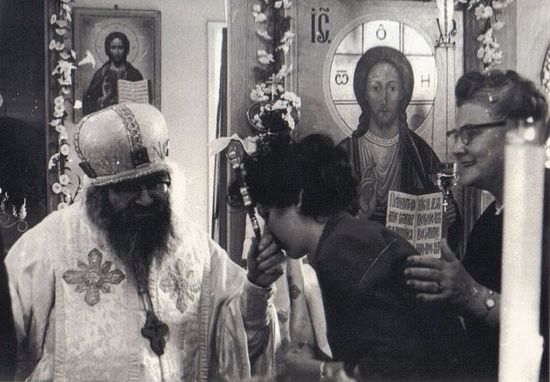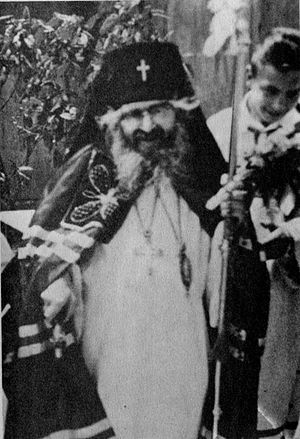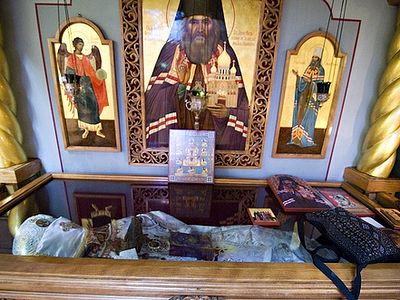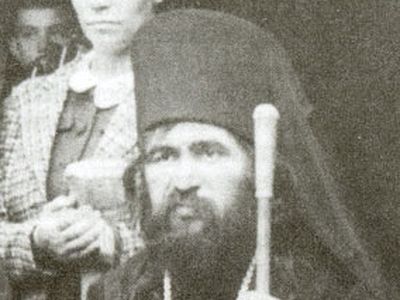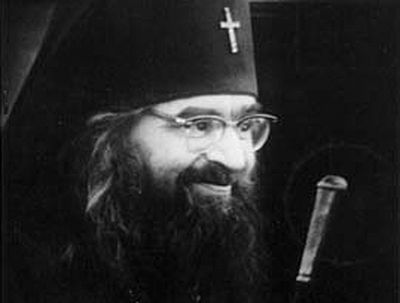Today the Russian Orthodox Church Outside of Russia celebrates the uncovering of the relics in the city of San Francisco of its great contemporary saint, Holy Hierarch John (Maximovitch) of San Francisco. Archpriest Andrew Phillips talks about St. John and his "Shanghai Theology".
Introduction
Recently a visitor from another Local Church asked if he could leave some booklets about degrees in academic theology in the church shop. I told him that it was not worth leaving them here, for, however interesting, none of our people studies academic theology, rather we try and live theology. At the Last Judgement, it will be no good answering the Just Judge that, ‘I have a Masters in Theology from X or I have a Doctorate in Patristics from Y’. We hope to hear these words: ‘Come, you blessed of my Father, inherit the kingdom prepared for you from the foundation of the world: For I was hungry and you gave me food; I was thirsty and you gave me drink; I was a stranger and you took me in; Naked and you clothed me; I was sick and you visited me; I was in prison and you came to me’ (Matt. 25, 34-36).
Of course, academic theology has its place and its uses and its schools: Paris, Oxford, Heidelberg, Cambridge, Rome, Fordham etc. But the real theology of the Church is a lived theology, for it is founded on spiritual experience and not on booklore and the abstract thoughts of the cold brain, on the experience of the inner heart warmed by grace, expressed above all in deeds – though those can also be found expressed in words, especially in the Lives of Saints. Real theology does not have ‘schools’, but centres, which are in monasteries, hermitages, cathedrals and parishes such as: Carthage, Cappadocia, the Thebaid, Milan, Lerins, the Studion, Mt Athos, Rila, Suceava, Radonezh, Valaam, Optina, Pochaev (of which Jordanville is a skete or offshoot), Zhicha, Chelije….and one of the most recent – Shanghai.
True, when asked about the spiritual leadership of ROCOR, we may think of individuals like Metr Antony of Kiev, Archbishop Vitaly (Maximenko), Archbishop Averky, Metropolitan Philaret, Ivan Andreyev and others. However, above all of them stands one who is recognized worldwide not only as an Orthodox thinker, writer and inspirer, but also as a universal saint: St John of Shanghai. His writings, sermons, articles and decrees show the three essential elements of his spiritual leadership, which are not so often found in academic theology. If secular leadership combines single-mindedness with ruthlessness, spiritual leadership, like that of St John, is based on the four attributes of the Church, something far greater than himself but in which he participates: Unity, Holiness, Catholicity and Apostolicity.
Unity and Catholicity
As indicated by the very word ‘Shanghai’, St John’s life and theology – for the two things are the same among real theologians – shows Unity and Catholicity. In other words, St John’s influence was global, showing unity in diversity. He lived in many countries in Eastern Europe, China, the Philippines, Western Europe, North Africa, North America, his parents reposing in South America, and he had and has many spiritual children in Australia. So this Little Russian saint became a Great Global saint, a saint for all peoples. St John showed great openness, allowing a Western rite, when there was still such a thing before Vatican II, he preached, not provincially and parochially, not in a racially exclusive way which means spiritual death, but preached to all before the end. Unity and Catholicity mean that Shanghai theology is Global theology.
Holiness and Apostolicity
The Holiness of Shanghai theology is in its following of the Tradition in its integrity, without the compromises of either extreme, following the golden mean. For the Tradition means the presence of the Holy Spirit Who is the source of the Tradition. And whoever says the Tradition means the Apostles who first received the Holy Spirit, by Whom the Church was founded on the day of Pentecost. Those who stand in the Tradition follow the mainstream and do not find themselves in the dead ends of the fringes of the Church, in one extreme or another, in sects and cults. And those who follow the Tradition do not abandon the Faith, but look for the restoration of the Church and its influence over the State with the restoration of Tsardom. Holiness and Apostolicity mean that Shanghai theology is Eternal Theology.
Conclusion
One of the many disciples of ‘Shanghai theology’, the Californian Hieromonk Seraphim, wrote of this theology in his ‘God’s Revelation to the Human Heart’:
‘Why is the truth, it would seem, revealed to some and not to others? Is there a special organ for receiving revelation from God? Yes, although usually we close it and do not let it open up: God’s revelation is given to something called a loving heart’.
And here we come to the secret of Shanghai theology, the theology of the Church. It is immortal because it comes from the immortal heart, warmed by the love of God through the Holy Spirit. Thus, it deals with the matters of the Eternal Word of God. That is why academic theology, based on the mortal human brain, is forgotten after the fashion for it has passed, whereas real theology is eternal, for it expresses the Eternal One. At the end of this world, when all the libraries of the planet have burned down, what will remain? Shanghai theology.
